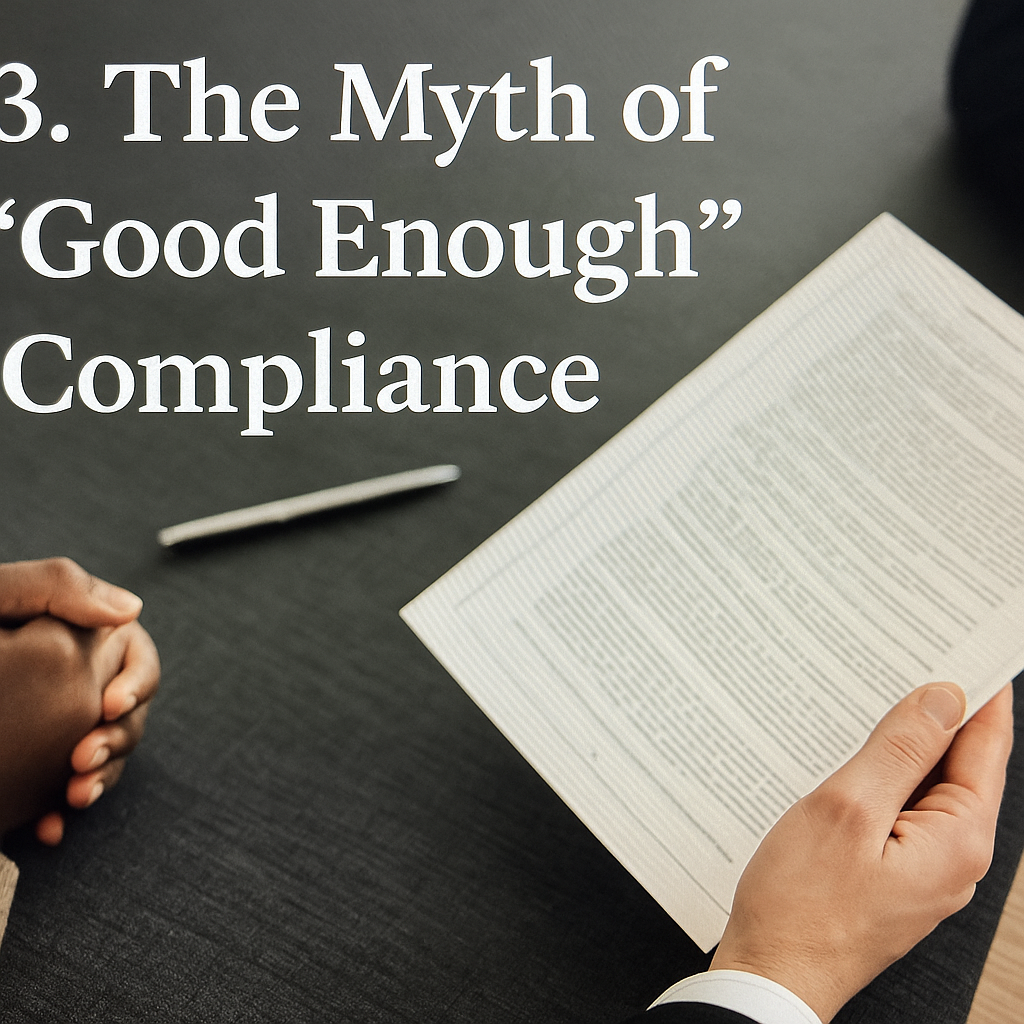1. The Client Who Did Everything “Right”
A fast-growing fintech in Nairobi came to us in a panic. On paper, they were compliant:
i. Their business was registered and tax filings were up to date.
ii. Employment contracts had been signed.
iii. They even had an employee facing data privacy policy, tucked somewhere in their records.
But when a major funding round entered due diligence, everything began to unravel. An investor-commissioned legal audit flagged several red flags.

First, there was no proper agreement between the founders. They’d verbally agreed on who owned what, but there was nothing in writing, no shareholder agreement, no vesting terms and no clear plan for what would happen if someone left or disagreements came up.
Second, there were no signed contracts for key team members. Two senior staff, including the lead developer, had been working on trust alone. Without contracts, there were questions about who really owned the work, what rules applied and whether the team would even stick around after investment.
Third, they had no documented compliance with Kenya’s Data Protection Act. Their mobile app was collecting customer data but there were no privacy notices, no consent logs and no internal protocol on what data was collected or where it was stored. The employee facing data privacy policy hadn’t been reviewed since launch and it didn’t reflect their actual data handling practices. The investor flagged this as both a legal risk and a reputational one.
From the outside, the business looked investable. On the inside, there was no legal scaffolding to support scale.The deal didn’t fall apart but the investment was delayed, renegotiated and conditional on us cleaning up everything in under 30 days.
To the client, it felt like legal landmines were appearing overnight. But the truth was simpler: They had focused on checking boxes not building defensible structures. And when scrutiny came, not from a regulator but from an investor, those boxes collapsed.
Their legal setup wasn’t strong enough to inspire trust, reduce risk or support growth. And in today’s environment, that alone can kill a deal.

2. The Turning Point: What Changed for That Client
When they came to us, the goal was simple: patch what might derail the deal.
But once we got under the hood, we saw an opportunity to do more than clean up, we helped them rebuild their legal infrastructure to support the business they wanted to be.
We didn’t just redraft policies. We:
i. Formalized founder equity with proper agreements and dispute protections;
ii. Cleaned up employment records and clarified IP ownership;
iii. Put in place internal checklists for hiring, vendor onboarding and regulatory filings;
iv. Designed a compliance calendar linked to actual operational triggers;
v. Trained their leadership team on legal-readiness across departments.

The result? Their investor came back with confidence not just in the numbers but in the structure.
They closed the round. They signed two enterprise clients who now require regular compliance attestations. And they now use their legal readiness as a value proposition in every pitch deck.
What changed? They stopped seeing law as a patch and started using it as infrastructure.
3. The Myth of ‘Good Enough’ Compliance
Many Kenyan businesses operate on assumptions not structure. We hear it all the time:
“We have a lawyer and a few contracts, we’re fine.”
“We’ll sort that out if it ever becomes an issue.”
“We’re still small. These laws don’t really apply to us yet.”
But when trouble comes, a regulator, a dispute, a major deal, those assumptions fall apart.

Here’s where the ‘bare minimum’ gets exposed:
- Contracts that aren’t enforceable. You downloaded a template or copied one from a friend. But it lacks key terms. Or worse, it is governed by UK law with no dispute clause. When the relationship sours, it offers no real protection.
- Data policies that don’t match reality. You have a privacy policy on your website. But in practice, no one on your team understands it. There’s no proper legal basis for processing personal data, no consent, no audit trail, no controls. That’s how businesses end up on the ODPC’s radar or in the press.
- Directors signing what they don’t understand. We have reviewed agreements with hidden personal guarantees, unclear obligations or clauses that expose the entire board. When the dust settles, directors are left personally liable and shocked they ever signed.
Compliance is the difference between control and chaos when things go wrong. The real question isn’t
“Do we have a contract?”
it’s
“Will it protect us when it counts?”
If you can’t answer that with confidence, you’re not compliant. You’re just exposed.
4. The Real Cost of Minimalism
Many businesses think the risk of non-compliance is just a fine. It’s not. What we’ve seen and helped clean up are deeper consequences that don’t make headlines but quietly hurt the business:
i. KRA audits triggered by incomplete or inconsistent filings. One missing form or an unexplained payment can open up months of back-and-forth, distracting leadership and stalling growth.
ii. Employment claims from unclear contracts. Casual hires without proper terms come back with claims of unfair dismissal, unpaid dues or misclassification and the law usually sides with the employee.
iii. ODPC scrutiny from generic data policies. A copy-pasted privacy notice that doesn’t reflect how your business actually handles data is enough to land you in trouble, especially if a customer or former staff raises a concern.
These aren’t theoretical risks. They lead to delays in funding, lost partnerships and internal mistrust.

Minimal compliance creates maximum friction when your business starts to grow. And by the time it shows, you’re already paying for it.
5. What Modern Compliance Actually Looks Like
Legal compliance in Kenya today is no longer about ticking boxes, it’s about being audit-ready, investor-ready and dispute-ready at all times.
Here’s what that looks like in practice:
i. Legal hygiene across departments. Every function, HR, Finance, Tech, Procurement should know what rules apply to them and have documentation to back it up. Compliance isn’t just legal’s job. It’s everyone’s risk.
ii. A clear paper trail for every major risk area. From employment contracts and tax filings to NDAs, IP assignments and privacy notices, there should be no grey areas. If something goes wrong, your defence is what’s on paper.
iii. Staff who know the basics and escalate early. We’ve seen junior staff trigger legal exposure just by sending the wrong email or ignoring a red flag. Training your team not just your lawyer is the difference between control and clean-up.

Modern compliance isn’t just law. It’s operational clarity. It protects the business, earns trust and allows you to grow without looking over your shoulder.
6. If You’re Only Doing the Minimum, You’re Already Behind

In Kenya today, the law doesn’t protect the unprepared. It exposes them.
Compliance isn’t about spending more, it’s about structuring smarter. The firms that thrive aren’t the ones with the biggest legal budget. They’re the ones who saw the risk early and built systems that hold.
If you’re building anything that matters, a company, a brand, a career, legal clarity isn’t optional. It’s leverage.
Conclusion
Start Here. Start Smart.
If you’re not sure whether your setup would survive investor scrutiny, regulator interest or a staff dispute, you’re not alone. Most wouldn’t.
Start with a review. One honest session with an experienced legal counsel could save you years of clean-up, lost deals or legal exposure.
At Broline & Associates, we help you build legal structures that hold, in court, across contracts and under scrutiny. Whether you’re a founder, an executive or a team quietly holding the weight of risk, we’ll meet you where you are and show you how to move forward with clarity.


.svg)



.webp)